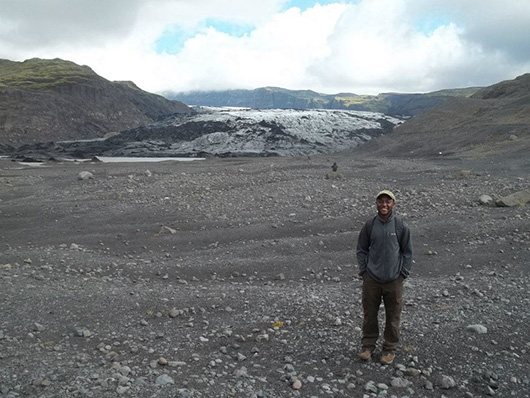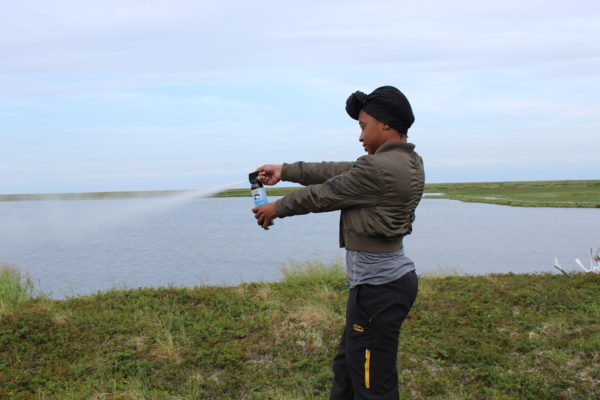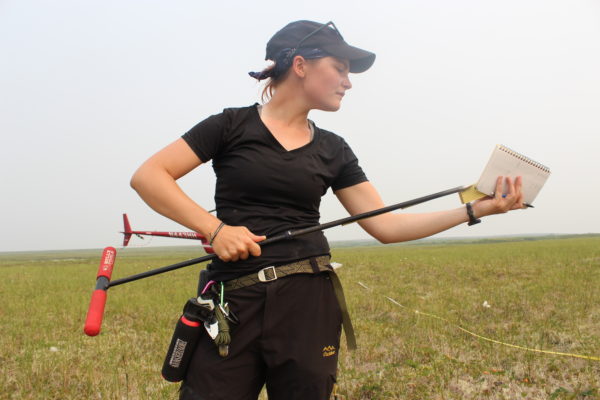My name’s Nigel Golden and I am a Pointer. For those who are not familiar with the name, it signifies that I’m a student at the University of Wisconsin Stevens Point in Stevens Point, Wisconsin, where I am double-majoring in Biology and Wildlife Ecology: Research and Management. I’ve done some traveling in Germany, Poland, and Iceland so this trip wouldn’t be the first rodeo I’ve been to. It will, however, be my first visit to Russia. I heard about the Polaris trip in 2012 when I was a participant in the Woods Hole Partnership Education Program and interned for the Woods Hole Oceanographic Institution. I didn’t believe I was ready for the field experiences in the Arctic, until after I climbed Rysy’s peak of the Tatra Mountains located near Zacopane in Poland the summer before I decided to apply. I am beyond excited for what the 2014 research expedition to Siberia to study climate change in the Arctic has in store for me! I can’t decide what has me fired up more: the science, the travel, the fieldwork, or the cultural exchanges. It’s probably the science.

Solheimajokull glacier, Iceland.
My background is in wildlife diseases. So why do I have interest in climate change you might ask? I’m interested in the Polaris Project because not only will it improve the way I critically think about and conduct scientific research, but because climate change not only affects the community I come from, but also the rest of the world. The bonus is that I get to make connections between my research in infectious diseases and the research in climate change. What are some large-scale responses of infectious diseases to climate change? Here’s one example: the incidence of tick-borne encephalitis has markedly increased in relation to milder winters and extended autumn activity in Sweden. Another example is the spread of tropical diseases into northern latitudes. Prior to 1999 West Nile Virus was not detected in the United States and Canada where it is now recognized as a disease of concern.
I’m not afraid to admit that I’m not an expert when it comes to arctic science or climate change. However, the discussions I’ve had with my fellow students, the scientists at Woods Hole, and the faculty of my home institution has given me assurance that I’m developing the knowledge to do some great science! A while back the students and I read an article on the vulnerability of permafrost carbon to climate change, and microbial decomposition of organic carbon is what immediately caught my eye. The continuous release of carbon into the atmosphere from ecosystems is strongly dependent on rates of decomposition by microbes. If microbial decomposition rates are high enough, then ecosystem processes may release more carbon from the soil than is captured by plants in photosynthesis. The first question I posed (well maybe not the first question) was what are ways to manage the decomposition of organic matter, and subsequent carbon release as permafrost thaws?
Through my discussions – with some awesome people – I was pointed in the right direction. In order to learn how we can manage carbon flux from soil microbes, we need to understand the processes that that either halt or speed up decomposition. There are many things that affect this: carbon-nitrogen ratios, nitrogen mineralization rates, soil moisture regimes, oxygen availability, and acidity.
However, I’ll take the best advice that I’ve heard – which was to head to Siberia with an open mind for new research interests. I believe that there is something there in the landscape that will capture my heart! I can’t wait to mobilize with my fellow colleagues in New York to head to an adventure of a lifetime.




Comments(9)-
-
-
-
-
-
-
-
-
Jacob Ponkratz says
June 10, 2014 at 10:22 pmGave me the chills just reading this, good luck Nigel, and can’t wait to read more about your travels. Chooch on brother!
Nigel Golden says
June 11, 2014 at 5:49 amThank you Jake, I appreciate it!
Emma Golden says
June 14, 2014 at 6:41 pmGood luck Nigel and look forward to hear your stories when you return. Live, Love, Learn, and Laugh.
Max Holmes says
June 15, 2014 at 9:15 amExcellent post Nigel. It’s really interesting to see how you are blending your ideas to come up with new interests. I’m excited to see how the process accelerates and changes once you get to the Siberian Arctic. I really wish that I could be with the expedition this year, but I’ll do my best here in Washington DC to spread the word about what you all are doing.
I’m thrilled that you are part of the Polaris Project!
Max Holmes
UW-Stevens Point CNR says
June 16, 2014 at 8:26 pmNigel – We wish you the best on your travels and can’t wait to follow your journey.
Peter Han says
June 27, 2014 at 12:07 amLove that we’re finally getting a wildlife guy up here.
I’m liking these microbial thoughts, reminds me of some stuff from Karin and Craig last year.
Troy Bernier says
June 28, 2014 at 3:30 amNigel, that sounds like an awesome opportunity. Success to you. Looking forward to reading about your results.
Onji says
July 1, 2014 at 4:24 pmNigel! I’m so proud! Can’t wait to read and hear all about it!
Francesca Guyton-Johnson says
July 7, 2014 at 4:46 pmHello, Nigel!
I am a co-worker and friend of your mom. I just want to wish you well and tell you that I am very proud of you! I have been praying for you and will continue to do so.
Enjoy and be blessed!
Francesca